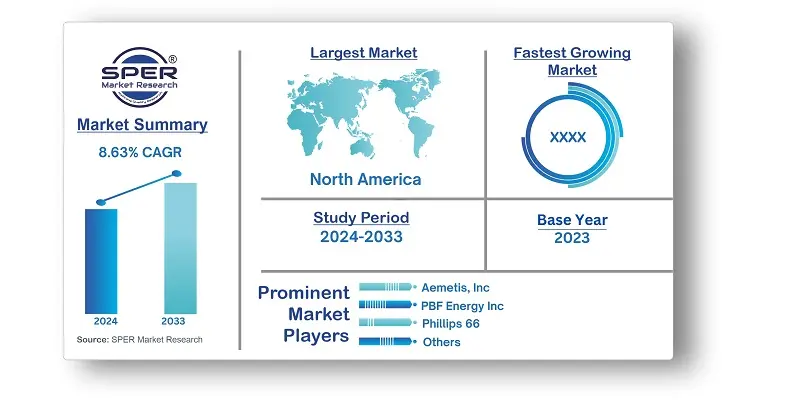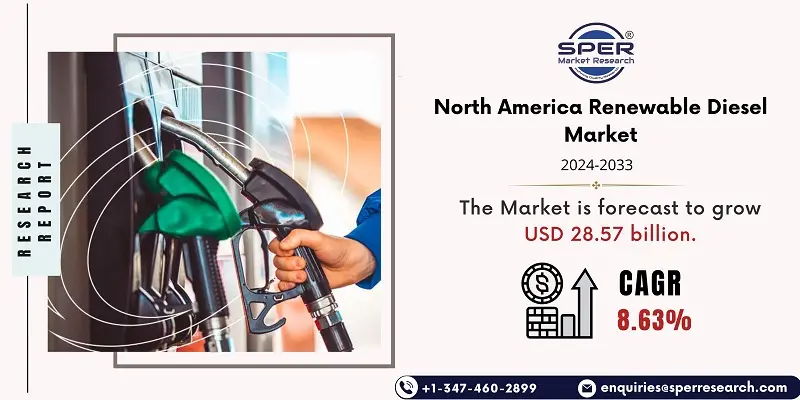
North America Renewable Diesel Market Growth, Size, Trends, Share, Revenue and Future Outlook
North America Renewable Diesel Market Size- By Type, By Application, By Feedstock- Regional Outlook, Competitive Strategies and Segment Forecast to 2033
| Published: Jun-2024 | Report ID: POAE2449 | Pages: 1 - 154 | Formats*: |
| Category : Power & Energy | |||
- November 2024; To improve its platform for procuring renewable raw materials, Nestle purchased Crimson Renewable Energy's spent cooking oil collection and aggregation business.
- September 2022; In order to better meet the growing customer demand for renewable and circular solutions, Nestle purchased Agri Trading to bolster its trading and sourcing of renewable raw materials.


| Report Metric | Details |
| Market size available for years | 2020-2033 |
| Base year considered | 2023 |
| Forecast period | 2024-2033 |
| Segments covered | By Type, By Application, By Feedstock |
| Regions covered | United States, Mexico, Canada, Cuba, Rest of North America |
| Companies Covered | Aemetis, Inc., Chevron Group (Renewable Energy Group), Gevo, Inc., Marathon Petroleum Corporation, Neste Oyj, PBF Energy Inc., Phillips 66, and Valero Energy Corporation. |
- Government and Regulatory Bodies
- Renewable Energy Companies
- Investors and Financial Institutions
- Commercial Fleet Operators
- Automobile Manufacturers
- Fuel Distributors and Retailers
- Environmental Organizations and NGOs
- Agricultural Sector
| By Type: |
|
| By Application: |
|
| By Feedstocks: |
|
- North America Renewable Diesel Market Size (FY'2024-FY'2033)
- Overview of North America Renewable Diesel Market
- Segmentation of North America Renewable Diesel Market by Type (Lipids, Cellulosic Biomass)
- Segmentation of North America Renewable Diesel Market by Application (Locomotive, Ships, Power Plant, Truck, Others)
- Segmentation of North America Renewable Diesel Market by Feedstock (Waste Oils, Vegetable Oils)
- Statistical Snap of North America Renewable Diesel Market
- Expansion Analysis of North America Renewable Diesel Market
- Problems and Obstacles in North America Renewable Diesel Market
- Competitive Landscape in the North America Renewable Diesel Market
- Impact of COVID-19 and Demonetization on North America Renewable Diesel Market
- Details on Current Investment in North America Renewable Diesel Market
- Competitive Analysis of North America Renewable Diesel Market
- Prominent Players in the North America Renewable Diesel Market
- SWOT Analysis of North America Renewable Diesel Market
- North America Renewable Diesel Market Future Outlook and Projections (FY'2024-FY'2033)
- Recommendations from Analyst
1.1. Scope of the report1.2. Market segment analysis
2.1. Research data source2.1.1. Secondary Data2.1.2. Primary Data2.1.3. SPER’s internal database2.1.4. Premium insight from KOL’s2.2. Market size estimation2.2.1. Top-down and Bottom-up approach2.3. Data triangulation
4.1. Driver, Restraint, Opportunity and Challenges analysis4.1.1. Drivers4.1.2. Restraints4.1.3. Opportunities4.1.4. Challenges4.2. COVID-19 Impacts of the North America Renewable Diesel Market.
5.1. SWOT Analysis5.1.1. Strengths5.1.2. Weaknesses5.1.3. Opportunities5.1.4. Threats5.2. PESTEL Analysis5.2.1. Political Landscape5.2.2. Economic Landscape5.2.3. Social Landscape5.2.4. Technological Landscape5.2.5. Environmental Landscape5.2.6. Legal Landscape5.3. PORTER’s Five Forces5.3.1. Bargaining power of suppliers5.3.2. Bargaining power of buyers5.3.3. Threat of Substitute5.3.4. Threat of new entrant5.3.5. Competitive rivalry5.4. Heat Map Analysis
6.1. North America Renewable Diesel Market Manufacturing Base Distribution, Sales Area, Product Type6.2. Mergers & Acquisitions, Partnerships, Product Launch, and Collaboration in North America Renewable Diesel Market
7.1. North America Renewable Diesel Market Size, Share and Forecast, By Type, 2020-20267.2. North America Renewable Diesel Market Size, Share and Forecast, By Type, 2027-20337.3. Lipids7.4. Cellulosic Biomass
8.1. North America Renewable Diesel Market Size, Share and Forecast, By Application, 2020-20268.2. North America Renewable Diesel Market Size, Share and Forecast, By Application, 2027-20338.3. Locomotive8.4. Ships8.5. Power Plant8.6. Truck8.7. Others
9.1. North America Renewable Diesel Market Size, Share and Forecast, By Feedstocks, 2020-20269.2. North America Renewable Diesel Market Size, Share and Forecast, By Feedstocks, 2027-20339.3. Waste Oils9.4. Vegetable Oils
10.1. North America Renewable Diesel Market Size and Market Share
11.1. North America Renewable Diesel Market Size and Market Share By Region (2020-2026)11.2. North America Renewable Diesel Market Size and Market Share By Region (2027-2033)11.3. United States11.4. Mexico11.5. Canada11.6. Rest of North America
12.1. AEMETIS, INC.12.1.1. Company details12.1.2. Financial outlook12.1.3. Product summary12.1.4. Recent developments12.2. CHEVRON GROUP12.2.1. Company details12.2.2. Financial outlook12.2.3. Product summary12.2.4. Recent developments12.3. GEVO, INC.12.3.1. Company details12.3.2. Financial outlook12.3.3. Product summary12.3.4. Recent developments12.4. MARATHON PETROLEUM CORPORATION12.4.1. Company details12.4.2. Financial outlook12.4.3. Product summary12.4.4. Recent developments12.5. NESTE OYJ12.5.1. Company details12.5.2. Financial outlook12.5.3. Product summary12.5.4. Recent developments12.6. PBF ENERGY INC.12.6.1. Company details12.6.2. Financial outlook12.6.3. Product summary12.6.4. Recent developments12.7. PHILIPS 6612.7.1. Company details12.7.2. Financial outlook12.7.3. Product summary12.7.4. Recent developments12.8. VALERO ENERGY CORPORATION12.8.1. Company details12.8.2. Financial outlook12.8.3. Product summary12.8.4. Recent developments12.9. Others
SPER Market Research’s methodology uses great emphasis on primary research to ensure that the market intelligence insights are up to date, reliable and accurate. Primary interviews are done with players involved in each phase of a supply chain to analyze the market forecasting. The secondary research method is used to help you fully understand how the future markets and the spending patterns look likes.
The report is based on in-depth qualitative and quantitative analysis of the Product Market. The quantitative analysis involves the application of various projection and sampling techniques. The qualitative analysis involves primary interviews, surveys, and vendor briefings. The data gathered as a result of these processes are validated through experts opinion. Our research methodology entails an ideal mixture of primary and secondary initiatives.



Frequently Asked Questions About This Report
PLACE AN ORDER
Year End Discount
Sample Report
Pre-Purchase Inquiry
NEED CUSTOMIZATION?
Request CustomizationCALL OR EMAIL US
100% Secure Payment






Related Reports
Our Global Clients
Our data-driven insights have influenced the strategy of 200+ reputed companies across the globe.




















